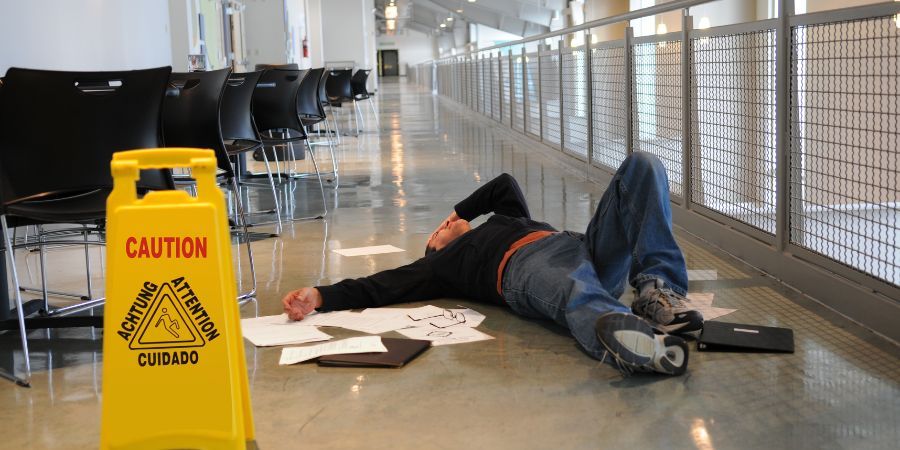Contact Us!
Phone: 716-839-9700
Email: info@coppolalegal.com
Fax: 716-408-9220
Find Us!
4033 Maple Road, Suite 100
Buffalo, NY 14226
Follow Us!
Stay Informed!
Contact Us!
Phone: 716-839-9700
Email: info@coppolalegal.com
Fax: 716-408-9220
Find Us!
4033 Maple Road, Suite 100
Buffalo, NY 14226
Follow Us!

- Home
- Practice Areas
- Premises Liability
Premises Liability Lawyers in Buffalo
In New York, premises liability refers to the legal responsibility that a property owner or possessor has to ensure that their property is safe for others to use. This includes the responsibility to maintain the property in a reasonably safe condition, to repair any known hazards, and to warn others of any potential dangers. If a person is injured on another’s property due to the property owner’s negligence, they may be able to bring a premises liability lawsuit to recover damages for their injuries.
Who Is Responsible if I Am Injured Falling?
In general, you may be able to sue a business if you trip and fall at their store if the fall was caused by a dangerous condition on the property and the business was aware of the condition or should have been aware of it and failed to address it. This is known as premises liability.
To prove liability in a slip and fall case, you will need to show that the business had a duty to maintain the property in a safe condition, that they failed to fulfill that duty, and that this failure caused your injuries.
What Dangerous Conditions Can Lead to Trips or Slips and Falls?
Examples of dangerous conditions that could lead to a slip and fall accident include:
- Wet or slippery floors without warning signs
- Uneven or cracked sidewalks or flooring
- Poor lighting in stairwells or parking lots
- Obstructed walkways or aisles
- Snow or ice in parking lots, sidewalks, and entryways
A trip and fall lawsuit is a type of premises liability lawsuit in which a person claims they were injured as a result of tripping or falling on someone else’s property. This can include falling due to a hazardous condition on the property, such as a broken sidewalk or a wet floor without proper warning signs. In order to succeed in a trip and fall lawsuit, the plaintiff (the person bringing the lawsuit) must be able to prove that the property owner or possessor was negligent in maintaining the property, and that this negligence was the cause of their injuries. The injured party also must show that the property owner had actual or constructive knowledge of the dangerous condition and failed to fix or warn of the condition.
What is Actual Notice?
In New York, “actual notice” refers to a situation where a property owner or an agent of the property owner is aware of a dangerous condition on the property. This means that they had direct knowledge of the condition and that they knew or should have known that the condition could cause harm to people who were on the property.
For example, if a customer slips and falls on a wet floor at a store, and the store manager is aware that the floor is wet and has not taken steps to clean it up or put up warning signs, the store manager would have had actual notice of the dangerous condition.
Having actual notice of a dangerous condition on the property is an important factor in determining liability in a premises liability case in New York. If the property owner or an agent of the property owner had actual notice of the dangerous condition and failed to address it, they may be held liable for any injuries that result from it.
What Is Constructive Notice?
In New York, “constructive notice” refers to a situation where a dangerous condition on a property is so obvious that the property owner or an agent of the property owner should have known about it, even if they were not directly aware of it. This means that the condition existed for a long enough period of time that a reasonable person would have discovered and corrected it.
For example, if a customer slips and falls on a wet floor at a store, and the store manager is not aware that the floor is wet, but the floor has been wet for several hours, then the store manager should have known about the condition because a reasonable person would have discovered it and taken steps to clean it or put up warning signs. In this case, the store manager would have had constructive notice of the dangerous condition.
Having constructive notice of a dangerous condition on the property is an important factor in determining liability in a premises liability case in New York. If the property owner or an agent of the property owner had constructive notice of the dangerous condition and failed to address it, they may be held liable for any injuries that result from it.
While constructive notice and actual notice are different, they are both important concepts that an experienced attorney will explore when representing an injured person in a premises liability claim.
What Do I Need to Prove in a Slip and Fall Case?
In order to prove liability in a premises liability case, the plaintiff must show that the property owner or an agent of the property owner had actual or constructive notice of the dangerous condition and that this failure caused the plaintiff’s injuries.
The burden of proof is on the plaintiff, and businesses are not automatically liable for slip and fall accidents that happen on their property. If you have been injured in a slip and fall accident, you should speak with an attorney who can help you understand your rights and determine if you have a valid claim.
In New York, you have a limited time in which to file a lawsuit, known as the statute of limitations. Calculating statute of limitations dates can be very confusing, and an error in evaluating the date, defendant (the person or party being sued), and type of claim can be critical, so you need to talk to an experienced attorney as soon as possible after suffering an injury.
Can I Bring a Lawsuit if I’m Injured on Someone Else’s Property?
Yes. There are important and complex issues that need to be evaluated related to how the accident happened, who may be at fault, and what deadlines exist to bring a claim. You should consult with an experienced personal injury attorney who can evaluate your case and advise you on your legal options. Your lawyer can help you gather evidence, negotiate with insurance companies, and represent you in court if necessary. The personal injury attorneys at The Coppola Firm have decades of experience representing people who have been injured. We are conveniently located in suburban Amherst, New York, with a ground floor office, close, free parking, and easy office access. Our lawyers will come to meet you at your home, office, or hospital, or via call or videoconference to minimize your need to travel, if you like. The lawyers at The Coppola Firm represent people across the State of New York. Speak to a Buffalo premises liability lawyer about your case today by calling (716) 839-9700 or filling out the online contact form.
- Bicycle Accidents
- Boating Accidents
- Burn Injuries
- Bus Accidents
- Business Disputes
- Charter Schools
- Commercial Real Estate
- Dog Bites
- Employment Law
- End-of-Life Wishes and Planning
- Healthcare
- Motorcycle Accidents
- Nursing Home Negligence
- Product Liability
- Traumatic Brain Injury
- Trucking Accidents
- Wrongful Death
- Business & Entrepreneurship
- Free Consultation
- Personal Injury
- Premises Liability
-
The Coppola Firm is amazing.
June 30, 2024The Coppola Firm is amazing. The response time is quick and professional. I would recommend The Coppola Firm for your legal needs.
Debbie A. -
When someone throws a punch, Lisa hits back 10X as hard.
June 8, 2024I came to the Coppola Firm during one of the most difficult times in my professional career, when a past employer tried to enforce a Noncompete Agreement through legal intimidation. Lisa and her team were such a strong support system; they gave me their undivided attention, actively involved me in strategy discussions, and made me feel informed every step of the way. I honestly felt like I was their only client at times. When someone throws a punch, Lisa hits back 10X as hard. After seeing Lisa’s team’s countersuit to scare tactics, my former employer asked me to settle. I highly recommend the Coppola Firm- my situation alone speaks volumes to this Firm’s dedication.
Katie S. -
My attorney David Goodman was extremely professional, honest and didn’t leave me confused on anything.
April 14, 2024My attorney David Goodman was extremely professional, honest and didn’t leave me confused on anything. He was extremely thorough. I was very pleased with the complete turnaround time of completion of the case. I would highly recommend this firm!
John F.
Phone: 716-839-9700
Email: info@coppolalegal.com
Fax: 716-408-9220
© The Coppola Firm
NAICS Code: 541100
Attorney Advertising. Prior results do not guarantee a future outcome.
